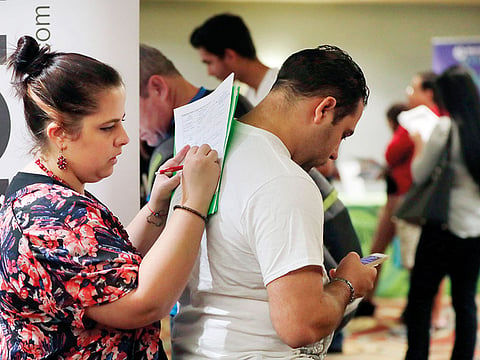Solid US jobs data propels markets and the dollar
But Apple and tech stocks in general remain under some duress

London: World shares have rallied on hopes that the US and China were starting to repair their badly damaged trade relations, while a bumper US wage data helped the dollar regain some strength.
The signals on trade triggered a global surge in risk appetite that lifted metals and swathes of trade-sensitive currencies and bond markets — but it was equities that saw the strongest reaction. A buoyant Asian session, where most of the major markets gained by 2.5- to 4 per cent, put emerging market stocks up 3 per cent and on course for their best day and week since early 2016.
“When Trump wants to bump the market ahead of the mid-terms, the market likes it,” said Saxo Bank’s head of FX strategy, John Hardy, referring to next week’s US elections.
In Europe, Germany’s export-heavy DAX jumped 1.5 per cent in its best session since July. Traders, though, did trim back Wall Street futures gains after a strong monthly US non-farm payrolls report spurred rate rise expectations.
US job growth rebounded sharply last month and wages recorded their largest annual gain in more than nine years, the data showed, pointing to further labour market tightening that could encourage the Federal Reserve to raise interest rates again in December.
Those numbers contrasted with data showing slowing factory growth around the world, but for the day at least those worries were soothed by the brighter US-China mood.
The focus now is on whether the strong jobs report, particularly the wages data, will help push 10- and 30-year US bond yields up towards 3.5 per cent.
UK too inches closer to rate hike
Hopes Britain is closing in on a transitional deal for when it leaves the EU next year pushed sterling higher to $1.30 (Dh4.80), after enjoying its best day of the year on Thursday (November 1). If the pound doesn’t skid later it will be its second-best week of the year so far.
“Were it not for Brexit uncertainty, the Bank of England would probably have laid the groundwork [at its meeting on Thursday] for its next rate hike,” BNP Paribas analysts said in a note.
The rise on Wall Street is likely to be tempered by Apple shares, which tumbled 5.6 per cent in premarket trading after the company warned on Thursday about its upcoming holiday season sales. Apple CEO Tim Cook said some of the forecast disappointment was explained by releasing its top-end iPhone models, the XS and XS Max, in the fiscal fourth quarter.
Cook also said foreign exchange rates would have a $2 billion negative impact on Apple’s sales forecast. Cook added the firm was also “seeing some macroeconomic weakness in some of the emerging markets”, although he didn’t specify which ones.
The tech sector has taken a beating on Wall Street over the last month and Apple’s weak forecast fed into the same investor fears that have caused shares of Facebook, Amazon and Google to tumble.
BOX
Some of the key data driving markets
* The US Labour Department’s monthly employment report showed the unemployment rate steady at a 49-year low of 3.7 per cent even as more people entered the labour force.
Non-farm payrolls increased by 250,000 jobs last month as employment in the leisure and hospitality sector bounced back after being held down by Hurricane Florence. Wages recorded their largest annual gain in more than nine years.


